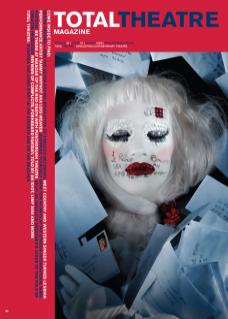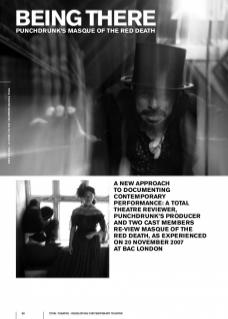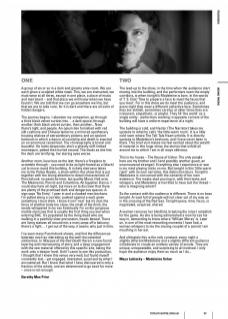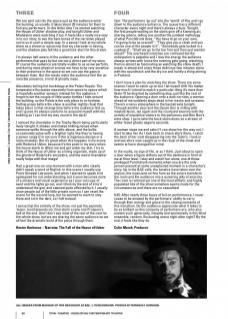One
A group of six or so in a dark and gloomy ante-room. We are each given a sculpted white mask. This, we are instructed, we must wear at all times, except in one place, a place of music and merriment – and that place we will know when we have found it. We are told that we can go anywhere we like, but that we are to take care, for it is dark and there are all sorts of hidden dangers.
The journey begins. I abandon my companion, go through a thick black velvet curtain into… a dark space; through another thick black velvet curtain, then another... Now there’s light, and people. An opium den furnished with red silk cushions and Chinese lanterns; a mirrored apothecary housing shelves of extraordinary potions; and an opulent bedroom in which a dance of courtship and death is enacted on an enormous raised bed. The choreography is brutal and beautiful. He looks desperate; she’s a ghastly stiff-limbed mannequin, petted then hurled around. The thuds as she hits the deck are terrifying, her staring eyes worse.
Another room, luxurious as the last: there’s a fireplace to scramble through – you need to be as light-footed as a (black) cat to move round this building. A rickety staircase takes me to the Palais Royale, a show-within-the-show that is put together with the loving attention to detail characteristic of Punchdrunk: no pastiche here, but quality Music Hall acts; The Mesmerist, Pierrot and Columbine, An Egyptian Dance. I could stay here all night, but move on to discover that there are plenty of the promised dark and dangerous spaces. A sign says ‘No Entry’. I peer in and a cloaked man beckons. I’m pulled along a corridor, pushed against a wall, given something I must drink. I know it isn’t ‘real’ but it’s real; the force of another body too close, the smell of the drink, the words whispered in my ear. Eventually I’m on the gorgeous marble staircase that is usually the first thing you see when entering BAC. It’s populated by the living dead who are walking in a painfully slow procession, heads bowed. There are living statues all around me; a man jumps off a balcony; there’s a fight… I get out of the way, it seems only just in time.
I’ve seen many Punchdrunk shows, and find the differences between each as interesting as the well-documented similarities. In Masque of the Red Death there’s a new-found layering and interweaving of story, and a deep engagement with the raw material offered by this specific site, taking the work onto a deeper level. Until I came to see this production, I thought that I knew this venue very well, but found myself constantly lost – yet engaged, interested, surprised by what I encountered. But I know that what I have discovered is only a fraction of the whole, and am determined to go back for more – once is not enough.
Dorothy Max Prior
Two
The lead-up to the show, in the time when the audience start moving into the building, and the performers roam the empty corridors, is when tonight’s Madeleine is born. In the words of T. S. Eliot ‘Time to prepare a face to meet the faces that you meet’. For in this show we do meet the audience, and every night they wear a different collective face. Sometimes they are skittish, sometimes careful, at other times they are irreverent, empathetic, or playful. They fill ‘the world’ as a single entity - performers working in opposite corners of the building will have a uniform experience of a night.
The building is cold, and Hector (The Narrator) takes me upstairs to what he calls ‘the little warm room’. It is a little cold room where The Tell-Tale Heart unfolds. It is directly upstairs to Madeleine’s bedroom, and I have never been in there. This brief visit makes me feel excited about the wealth of material in this huge show, the stories that unfold all around me to which I am in all ways oblivious.
This is my house – The House of Usher. The only people here are my brother and I (and possibly another guest, an unannounced stranger). Everything else I experience or see is my mind playing tricks on me. But tonight in this ‘little warm room’ with its own narrative, this distinction blurs. Tonight’s Madeleine is concerned with the certainty of her own existence. The masks start pouring in, with their looks and whispers, and Madeleine is horrified to have lost the thread – who is imagining whom?
So the contact with the audience is different. There is no boss tonight. A room full of people will not clear out of my way as in the crossing of the Red Sea. Tonight space, time, focus, is negotiated, acquired, shared.
A woman removes her blindfold, breaking the rules I establish for the game. As she is being admonished a man forces his way in, demanding to know where ‘William Moray’ is. Later on, in one of the most rewarding moments I have had, a woman whispers to me the closing couplet of a sonnet I am mouthing in her ear.
And ultimately this is the only constant: every night a slightly different Madeleine and a slightly different audience collaborate to create an endless variety of events. They are unique, unrepeatable, and surprising to all involved. I only hope the audience enjoy them as much as I do...
Maya Lubinsky – Madeleine Usher
Three
We are sent out into the space just as the audience enter the building, so usually it takes about 20 minutes for them to find any performers. In this limbo time I’ve started watching the House of Usher shadow play, and tonight Usher and Madeleine were watching it too. It feels like a really nice way in to our story, to see the bare bones of the narrative played out to us in such a simple way. In a sense I look at my whole show as a dream or opium trip that my character is having, and the shadow play felt like a good kick-start for this dream.
I’m always half aware of the audience and the other performers that pass by but are not a direct part of my story. Of course the audience are totally visible to us as we perform, and during more physical scenes we have to be very sensitive to their presence in the space so we can use the gaps in between them. But the masks make the audience feel like an invisible presence, a kind of ghostly mass.
Absolutely boiling hot backstage at the Palais Royale. The temperature fluctuates massively from space to space which is hopefully another sensory interest for the audience. I forgot to set the couple of little water bottles I hide around the building, so the Palais is the only place to re-hydrate. Setting props before the show is another nightly ritual that takes place in that strange time before the audience find us, and I guess it’s always useful to re-acquaint myself with the building so I can find my way round in the dark!
I noticed the chandelier in the Trophy Room being particularly lively tonight. It shakes and makes tinkling noises when someone walks through the attic above, and the bulbs occasionally pulse with a brighter light, like they’re having a power surge (I’m not sure if this is ingenious design or a lucky mistake). But it’s great when this happens in my scene with Roderick Usher, because it’s the point in my story when the house starts to affect me and get under my skin. I try to think of the House of Usher as a living organism, made up of the ghosts of Roderick’s ancestors, and the weird chandelier really helps with that image!
Had a great one-on-one moment with a man who clearly didn’t speak a word of English. In this scene I usually use Poe’s Annabel Lee poem, and when I started to speak it he apologised for not understanding, but it soon becomes more of a sensory and visual experience as I pour out cups of sand and the lights go out, and I think by the end of it he’d understood the gist, and seemed quite affected by it. I usually draw people out of the little private room so I can reset the scene for the second loop, but he seemed to want to stay there and sit in the dark, so I left instead.
I sense that the entirety of the show, not just the separate ‘loops’, build towards our final storm scene and Prospero’s ball at the end. And I don’t see most of the rest of the cast for the whole show, but we are sharing the same audience so we all feel the dramatic build of the piece through them.
Hector Harkness – Narrator, The Fall of the House of Usher
Four
7pm: The performers ‘go out’ into the ‘world’ of Poe and I go down to the audience entrance. The queue has a different character every night and there’s always a buzz. Tonight, the first people waiting on the stairs give off a knowing air, sharing advice, telling one another the jumbled mythology of what Punchdrunk does. “You have to go on your own, I’m going to be so scared!”, “They give you a cloak and you can be one of the people in it”, “Somebody gets locked in a cupboard”, “Shall we go to the bar first and then just wander about?” The overheard snatches are confused but the anticipation is palpable and I love the energy the audience always arrives with (once the evening gets going, watching them is almost as fascinating as watching the show itself). I sneak in ahead and enjoy those delicious few minutes alone with the soundtrack and the dry ice and hardly a thing stirring in Poeland.
I don’t have a plan for watching the show. There are some scenes I want to catch up on but I let myself drift. No matter how much I intend to watch a particular thing it’s more than likely I’ll be diverted by something else, just like the rest of the audience. Opening a door onto a dark corridor, a woman ahead of me suddenly stops dead in her tracks and screams. There’s a nervy atmosphere in the backstreets tonight. Through another door and the Opium Den is milling with masked faces, out again and the courtyard swarms with the activity of inquisitive visitors to the perfumery and Bon Bon’s wine shop. I go to take the back stairs down as a stream of white-faced ghosts eagerly ascends.
A woman stops me and asks if I can show her the way out. I start to take her. As I look back to check she’s there, I catch the back of her coat disappearing into the Tailor’s. I look in and see she’s now caught up in the ritual of the cloak and seems to have changed her mind.
In the vaults, no sign of life, or so I think. Just about to open a door when a figure slithers out of the darkness in front of me at floor level. I stay and watch her alone, one of those privileged Punchdrunk moments when you are the only person present at some unexplained moment in a character’s story. Up in the BAC café, the lunatics have taken over the asylum, the musicians on fine form as the actors transform the room and the audience into a quivering jelly of anarchy. The room is rammed yet one of the most athletic and highly populated bits of the show somehow seems made for the circumstances and there are no casualties!
9.45: After nearly three hours of full-on performance, I never cease to be amazed by the performers’ ability to carry through their energy and grace to the closing moments of this marathon. Do the audience appreciate what it takes to be as brilliant as this company of performers are, who also sustain such generosity, integrity and spontaneity in this blind ensemble, random, fluctuating arena night after night? By the end, it feels like they do.
Colin Marsh, Producer



